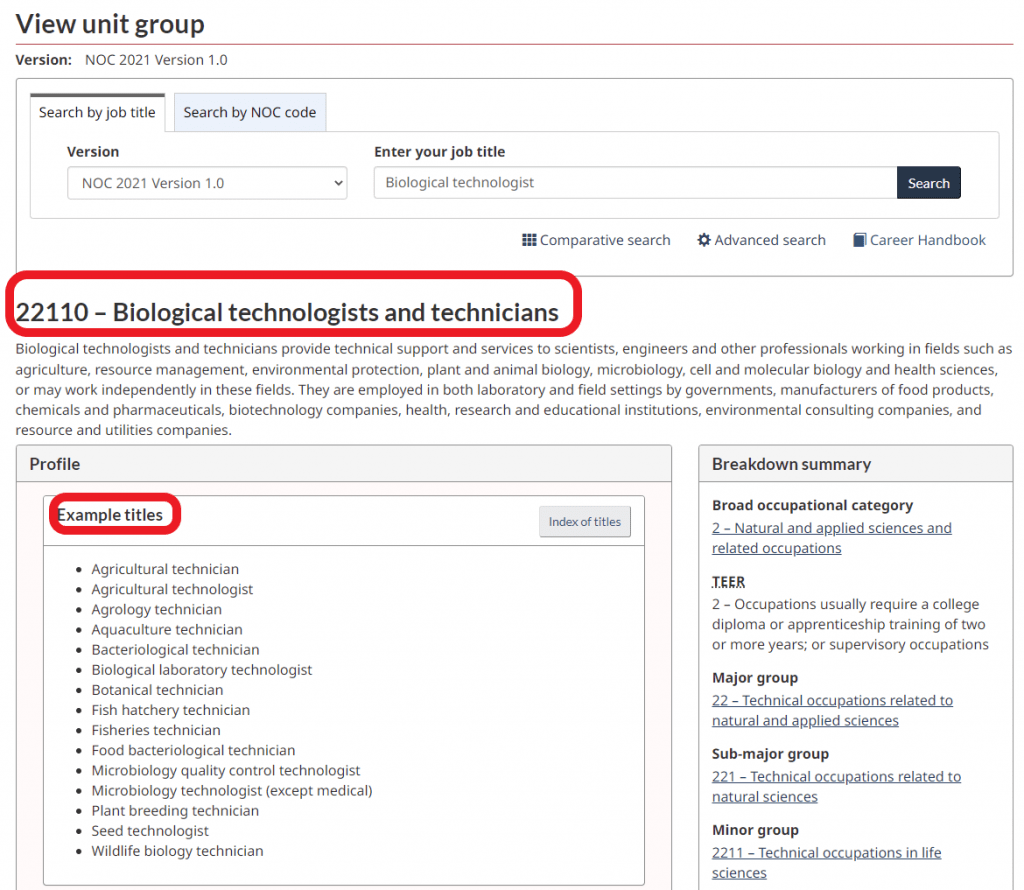
Canada is a great country to look for biotechnology jobs. Why? Canada is a world leader in biotechnology (bio-economy) with a large network of research hospitals, universities, laboratories, and companies. BioTalent Canada is the national sector council for the biotechnology industry. If you are a newcomer or plan to move to Canada and have experience in this industry, you will have opportunities. Biotechnology careers in Canada for technologists and technicians are available in both laboratory and field settings. Biotechnology salaries offer a good living. Learn more about biotechnology job requirements in Canada with this helpful overview.
Contents
- How to Immigrate to Canada as a Biotechnology Professional
- What to Expect When Pursuing a Biotechnology Career in Canada
- Requirements to Become a Biotechnology Professional in Canada
- Upgrading Your Skills to Meet Biotechnology Job Requirements
- Biotechnology Bridging Programs in Canada
- Biotechnology Schools in Canada
- Biotechnology Associations in Canada
- How Much Do Biotechnologists Make in Canada?
- Best Provinces to Work in Canada as a Professional Based on Biotechnology Salary & Lifestyle
- Pursuing a Biotechnology Career in Canada
- How to Find Your First Biotechnology Job in Canada
How to Immigrate to Canada as a Biotechnology Professional
Before You Move to Canada to Pursue a Biotechnology Career
Taking steps to prepare yourself before you move can give you a head start on your biotechnology career when you arrive in Canada. To improve your chances of successfully finding a biotechnology job, here are some steps you can take before you move:
- Research the Canadian labour market to learn what skills, experience, and qualifications you require.
- Attend the free webinar What to Know About the Canadian Job Market to learn about labour market conditions.
- Check out BioTalent Canada resources to learn how to showcase your experience to employers and determine how ready you are to work in Canada’s biotechnology sector.
- Assess your language skills by taking an online self-assessment on the Centre for Canadian Language Benchmarks website.
- Improve your language skills. To practice the profession, you must have advanced English language skills, as it’s the working language in the bio-economy sector.
- Enroll in language classes while in your home country and continue them when you arrive in Canada. Even if you speak fluent English or French, it’s helpful to improve your language skills.
- Gather and organize your official education, work, and identity documents while still in your home country. You may need to use a translation service if your documents are not available in English or French. Contact BioTalent Canada to identify what they require.
- Familiarize yourself with the procedures, laws, and legislation that govern the biotechnology profession in the province where you’ll settle.
- Know the name of your job in Canada (see example titles in the NOC 22110 (description below) and make a list of potential employers.
- Check out biotechnology salary and benefits information. Biotechnology salary and compensation plans can vary greatly by location, company, and other considerations.

What to Expect When Pursuing a Biotechnology Career in Canada
To work in biotechnology jobs in Canada, there are certain requirements you will need to meet that include:
- Completion of a two- to three-year college program related to agriculture, biology, microbiology, wildlife, or resource management is usually required to work as a biological technologist
- Completion of a one- to two-year college program in a related field to work as a biological technician.
For more advanced biotechnology jobs, you may require a university degree or master’s degree. Certification with provincial associations is voluntary.
Employment Outlook for Biotechnology Jobs in Canada

Advertisement:
According to a national study, Close-up on the bio-economy, the demand for talent in all sectors of Canada’s bio-economy will exceed supply by 2024. And the study predicts that by 2029, 65,000 additional employees will be needed. Given the skills shortage, internationally educated professionals will be an invaluable source of talent. This could be a great opportunity for future and recent immigrants to Canada with the right skills and background.
The bio-economy workforce in Canada covers many occupations, and research and development account for nearly half of all jobs. While Canada expects to see labour shortages for all bio-economy jobs, three areas will experience severe shortages until 2029:
- Manufacturing and production jobs
- Distribution and logistics
- Management, finance, and administration jobs.
However, it’s critical that you conduct thorough research of the national, regional, and local biotechnology job markets before you move to Canada. Make sure that you understand the job requirements and licensing requirements. You may need a certification before you can work in Canada if your job title is regulated.
You can find out if your biotechnology job is regulated, and the name of the professional certification and licensing body here.
Start Your Research with the NOC Code for Biotechnology Jobs in Canada
The National Occupational Classification (NOC) code for biological technologists and technicians is NOC 22110. Check out the NOC description for an overview of the role in Canada. It’s also helpful to know the various titles that biotechnologists use in Canada. This is helpful information to know when you begin your job search.
Advertisement:

Requirements to Become a Biotechnology Professional in Canada
Biotechnology career requirements can vary based on your career goals. You may need to go through credential recognition, skills upgrading, or complete a bridging program. Below are steps you will need to take to work in the biotechnology field in Canada.
Credential Recognition to Meet Biotechnology Job Requirements in Canada
It’s vital to research, develop a plan to find work, and understand the specific skill requirements for your occupation. BioTalent Canada’s website is a smart starting point.
The BioSkills Recognition Program helps internationally trained professionals bridge any gaps and meet Canadian standards. The program will recognize your competencies and connect you with employers within the sector.
You can participate in this program if you can legally work in Canada and know English fluently. While still in your home country, you can start the process by listing a summary of your competencies, credentials, and skills, and once you arrive in Canada, you may be asked to do a practical test observation.
Once your skills are recognized, you will be informed that you are BioReadyTM: that means you have demonstrated the required skills for a specific job function and have the competencies to work in the Canadian biotech industry. If for some reason, your skills are not recognized, you will be informed on how to upgrade your skills and join the program afterward.
You can also take an online BioSynergy Program that helps you integrate into the workplace. The program includes modules on effective communication, building interpersonal relationships, lifelong learning, and leadership skills. If you want a mentor, you can access a coaching module.
Credentials Assessment Services
If you plan to enroll in a college or university program to upgrade your skills, contact the school that you plan to attend. The school can guide you through the application process and identify the credential assessment agency you should use.
Make sure you highlight your international education and skills. Try to build on your existing knowledge and skills and explore university and college options thoroughly before you decide to continue your education. You might be able to get advanced standing, transfer some of your credits and benefit from prior learning assessment options.
Your international credentials and experience may allow you to gain credit or course exemptions. This way you will complete your program more quickly, without spending more money or repeating the education you already have.
Here are some credentials assessment services that you can consider:
World Education Services (WES)
Comparative Education Service: University of Toronto School of Continuing Studies
International Qualifications Assessment Service – Alberta (IQAS)
The International Credential Evaluation Service (ICES)
To find more organizations that provide credential evaluation, assessment and qualification recognition services click here.
Upgrading Your Skills to Meet Biotechnology Job Requirements

Upgrading your education and skills through a bridging program or other courses and workshops may be an important part of your journey to get into the bio-economy sector in Canada.
Canadian employers put a high emphasis on soft skills, which are personal attributes that enhance your interactions, job performance, and biotechnology career prospects. Unlike your hard skills, you can apply your soft skills broadly.
Soft skills, such as leadership, teamwork, and communication are important for biotech professionals. As an individual working in biotechnology, you are expected to work well with others in a team, have strong verbal and written skills, and collaborate with others from many different groups.
In addition to your technical knowledge, you’ll be judged on your listening, writing, and basic communication skills. If your hard skills will get you an interview, most probably it is your soft skills that will get you the job and help you to succeed in the job.
Language Training for Biotechnology Careers in Canada
You may have strong technical skills, but often that is not enough to get a job or maintain it afterward. You may need more training or skills upgrading, especially with regard to your communication skills and team dynamics.
Having strong skills in one or both of Canada’s official languages – English or French – is important for your future in Canada. Whether you choose to focus on learning or improving English, which is the working language in the sector, or French, which is the country’s other official language, will depend on which of the two languages most people speak in the area where you intend to live.
You may be eligible for Language Instruction for Newcomers to Canada (LINC) program. Otherwise, you can find other free or affordable classes in English as a Second Language (ESL) or French as a Second Language (FSL) classes through school boards or settlement agencies.
There are even language courses to teach you professional terminologies, such as job-specific language training and Occupation Specific Language Training (OSLT). And, if you already speak English at a high level, learning French is a good option, as it may offer you better opportunities.
Biotechnology Bridging Programs in Canada

These programs can help you to “bridge” your international experience and training to Canadian workplaces. Many colleges, universities, and immigrant-serving agencies offer bridging programs. You may be eligible for one. Do some research to find a program that’s suitable for you.
Ontario
University of Toronto (Mississauga)
Certificate in Life Science Enterprise Management
This program offers an intensive certificate in Canadian Biotechnology Enterprise. Courses include Canadian biotechnology and bio-policy, occupation-specific language training, and workplace culture and communications training. The program also offers employment services, mentoring, and personal coaching.
Biotechnology Schools in Canada
As a world leader in biotechnology, Canada has some of the top schools in the world. Many immigrants take further education after coming to Canada. Some even want to change careers or enhance their biotechnology careers with a Ph.D. or MBA.
There are over 30 schools that offer biotechnology courses and programs in Canada. Many of these schools offer multiple biotechnology programs and areas of specialization. You can enroll in programs and courses at the diploma, degree, master’s, and Ph.D. level.
Here are some of the top universities to consider:
- University of Toronto
- University of British Columbia (UBC)
- McMaster University
- University of Waterloo
- University of Calgary
- Queen’s University
- Simon Fraser University
- University of Manitoba.
Here are some colleges to consider:
- Fanshawe College
- Durham College
- Loyalist College of Applied Arts and Technology
- Centennial College of Applied Arts and Technology
- Fleming College
- Algonquin College
- Seneca College.
Click here for a list of Canadian Universities and Colleges.
Biotechnology Associations in Canada
BioTalent Canada is a national sector council that provides information about licensing and certification. It also offers professional development, education, networking opportunities, and resources.
You’ll find resources related to understanding the Canadian workplace, occupation-specific language skills, understanding of document use, and critical thinking skills. The website also includes labour market studies and news to help you understand the industry in Canada, opportunities, and challenges.
Professional Immigrant Networks
Professional immigrant networks are organized, volunteer-run member-based associations or networks created by and for immigrant professionals that seek to:
- create a forum to contribute to and enrich their respective communities
- provide opportunities for their members to find meaningful employment and achieve their professional goals.
These associations offer networking events, mentoring, information sessions, professional development opportunities, and connections to jobs. Here are some you can use:
Nova Scotia
Immigrant Services Association of Nova Scotia (isans)
Ontario
Professional Immigrant Networks (Toronto)
Alberta
Calgary Region Immigrant Employment Council (CRIEC)
How Much Do Biotechnologists Make in Canada?

The national biotechnology salary per hour ranges from a low of $17.28 to a high of $37.95/hour (based on 2022 figures) according to the Government of Canada Job Bank. Based on a 40-hour workweek, this means that a yearly salary could range from $35,942 – $78,936/year.
Biotechnology salaries are affected by many factors such as your job title, credentials, education, experience, and where you live. The lowest median biotechnology salary is in British Columbia. The highest is found in Yukon and Saskatchewan.
Biotechnology Salary in Canada
Here are the most recent Biotechnology salary numbers in Canada. Biotechnology salary information is not available for all provinces:
| Province | Low ($/hour) | Median ($/hour) | High ($/hour) |
|---|---|---|---|
| Canada | 17.28 | 25.12 | 37.95 |
| Alberta | 22.00 | 23.00 | 42.31 |
| British Columbia | 17.00 | 19.23 | 40.66 |
| Manitoba | 15.38 | 21.58 | 32.69 |
| New Brunswick | 20.00 | 25.64 | 37.66 |
| Newfoundland and Labrador | N/A | N/A | N/A |
| Northwest Territories | N/A | N/A | N/A |
| Nova Scotia | 17.36 | 27.00 | 39.61 |
| Nunavut | N/A | N/A | N/A |
| Ontario | 17.28 | 23.48 | 43.62 |
| Prince Edward Island | 15.84 | 27.00 | 34.36 |
| Quebec | 18.00 | 26.83 | 37.00 |
| Saskatchewan | 23.30 | 29.64 | 36.54 |
| Yukon | 21.99 | 31.17 | 40.37 |
Best Provinces to Work in Canada as a Professional Based on Biotechnology Salary & Lifestyle
Biotechnology is an exciting growing field combining biology with technology and engineering. Canada’s bio-economy is likely to require 65,000 additional workers by 2029. Its applications in medicine, agriculture, and other fields put biotechnologists in high demand. Before deciding where you want to settle in Canada, research and find out where there is a higher demand for your specific biotech expertise.
While jobs may be available across Canada, you may find specific regions or cities where the demand is greater. Typically, there will be more job opportunities in larger cities. Vancouver is a top option because it has over 70 local biotech companies. Montreal, Toronto, and Ottawa are also good options.
You can find biotechnology labour market information on Bio-talent Canada’s website. It will help you target your job search by identifying the best locations for biotechnology jobs and where you can offer your skills.
Pursuing a Biotechnology Career in Canada

In Canada, most biotechnology companies are small or medium-sized businesses. They are cross-sectoral and may be involved in various stages of product development, like research, clinical and regulatory trials, production, and marketing.
With a skills shortage in Canada, you can find biotechnology career opportunities in agriculture, biosciences, environment, health, industrial applications, natural resources, nanotechnology, and genomics.
Major Employers for Biotechnology Jobs in Canada
Some of the top biotechnology employers in Canada include:
- BELLUS Health
- Amgen
- Fusion Pharmaceuticals
- Zymewire
- Altis Labs
- Nplex biosciences
- Deep Genomics
- AstraZeneca
- NervGen Pharm
- ESSA Pharma
Visit Canada’s Best Diversity Employers to look for employers hiring in your field. This special designation recognizes Canada’s best employers for their commitment to diversity, equity, and inclusion in the workplace.
How to Find Your First Biotechnology Job in Canada
The outlook for biotechnology jobs in Canada is positive, with more than a third of companies currently experiencing a labour shortage. However, the Canadian job market is competitive, so you need to prepare for your job search. As well, finding biotechnology jobs in Canada may be different than in your home country. The following tips can help prepare you for a successful job search:
Biotechnology Career and Job Search Strategies
It’s best to search for jobs in the province and city when you plan to settle. And it’s important to carefully research biotechnology job prospects in the region and develop a plan to find work. When searching for biotechnology jobs, consider these tips:
- Broaden your search and include alternative biotechnology careers and sectors.
- Seek a mentor in the biotechnology sector, such as a retired biotechnology professional, who would give you valuable insights and advice, and probably introduce you to their professional network.
- Join business-related job-finding or networking clubs through immigrant-serving agencies.
- Attend industry job fairs and regularly check job boards.
- Ask your contacts in the industry for help. Let them know you are job searching and would like to make industry connections. If someone well-established in biotech can forward your resume to a potential employer (instead of you forwarding it yourself), that gives you a leg up.
- Check out BioTalent Canada’s job bank called The PetriDish. Here you can post your resume, view job postings and subscribe to job alerts.
- Some colleges or associations may maintain a job bank or suggest a commercial job site.
- Check company websites for job openings. Depending on the size of the company, it may be helpful to connect with someone you know who works in the company (or someone who knows someone) to help you get your resume fast-tracked to the hiring manager.
Work with Immigrant Settlement Agencies
Most settlement agencies offer free help to find job openings, update your resume, write a Canadian-style resume, and prepare for interviews. Learn more about Services in Canada to Help Newcomers Settle.
To find immigrant services in your area, click here.
Tips for Writing a Biotechnology Resume
There are different ways to write a resume for the biotech sector. However, most professionals working in the industry will agree on a few guidelines to write the ideal resume. This can affect your career opportunities, how many interview calls you receive, and even your biotechnology salary.
Accomplishments
Like most scientists, you may be very modest and not see your accomplishments as highly as the rest of the world. When you write your resume, list your most relevant accomplishments and strengths related to biotech.
Make sure to list your accomplishments early on in your resume: the top-tier school, or your education; any articles you may have published in any top-tier biotechnology journals; your patented work and awards received.
Experience
Biotech industry resumes are ordered chronologically, with your most recent experience first. Mention your job experience, including your internships, consulting jobs, and volunteer work.
Generally, with science industry jobs, hiring managers look for people who have achieved unique things. Therefore, it is important for you to list not only things you’ve done but also things you have achieved.
Consult with Different People
When meeting biotechnology career counsellors, or people who work at a biotech company, ask them for their best advice regarding resume requirements for the industry.
Related Posts:
Eight Tips to Write a Canadian-Style Resume
Cover Letter Format that Employers Notice
Informational Interviews
While job prospects look positive for biotechnologists, landing that next opportunity, especially for newcomers, may require extra effort and outreach. One way to do this is by requesting an “informational interview.” This is a brief (20–30-minute) meeting that you schedule with a person who is currently working in the biotechnology industry to learn more about the field in Canada.
Informational interviewing can be a great way to put your communication, research, and interpersonal skills into practice for your job search.
You should not try to get a job during an informational interview but rather find out whether a particular position or employer might be a good fit for you. An informational interview with a contact from your network can be a great source of career information. In addition to basic information about a particular type of industry (such as you might find on a company website), it also offers you the benefit of a professional’s first-hand experiences and impressions.
Make a list of the biotechnology companies that operate in your area. Then, use professional organizations, LinkedIn, and other networking resource tools to identify people that you can connect with to request an informational interview.
Biotechnology Career Networking Tips
Networking is a vital activity that can help you discover job leads, gain industry insights, and meet others in your field in Canada. And because many job vacancies are not advertised, people in your network can help you discover jobs in this “hidden job market.” This also applies to biotechnology careers.
You’ll benefit by meeting other professionals, building relationships, and sharing information, you might even hear about job opportunities you wouldn’t have found online. It could even lead to a higher biotechnology salary.
Good places to network include conferences, professional associations, and online spaces such as LinkedIn. LinkedIn is a great site to reconnect with former colleagues and employers, search for companies and jobs that you have an interest in and make connections with others in your field. You can also join related professional groups. But remember, you must allow time to cultivate and grow the ties you establish through networking.
Related Post:
Interview Techniques for Biotechnology Jobs in Canada
The outlook for the biotech industry looks good and whether you’re interested in agriculture, pharmacy, medicine, or bioengineering, you will find opportunities. However, before you land the job, you’ll need to ace the interview. Here are helpful tips to prepare for an interview in biotechnology.
Look for Job Opportunities
To be invited to an interview, you must first find a job opening. Regularly check online classified ads and other specialized sites, such as The PetriDish, which only list biotech job openings. Also, check the websites of medium to large pharmaceutical companies. Once you find an opening, check if you know someone at the company – your application will likely be given more attention if you reach out.
Stay Current with Industry News
Staying current about the industry in Canada will allow you to showcase your knowledge in interviews comfortably. Subscribe to the biotech newsletters or blogs to stay informed.
Highlight Your Technical Knowledge
As your potential employer has never seen you at work in the lab, they’ll ask you questions to figure out how you’d perform on the job. You may be asked to solve a hypothetical question so they can assess your depth and technical knowledge.
Hone Your Interdisciplinary Skills
Biotech intersects with many disciplines, so it’s important to know about the other related disciplines as well. So, when you’re studying or working, make sure to talk to people in other disciplines and with different backgrounds.
With a positive outlook for biotechnology jobs in Canada, now is the time to check out your options.
Interested in learning more about working in Canada? Check out our Finding a Job in Canada resource page. We can help you achieve your career goals in Canada.

